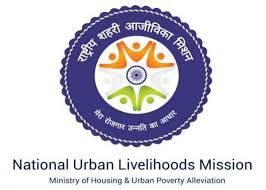National Urban Livelihood Mission (NULM)

- 05 Oct 2024
In News:
The Government is set to launch NULM 2.0, the latest iteration of the National Urban Livelihood Mission (NULM), aimed at enhancing the livelihoods of urban poor and vulnerable populations. This version will specifically target six key groups: construction workers, gig workers, waste management workers, care workers, domestic workers, and transportation workers.
Overview of DAY-NULM
The Deendayal Antyodaya Yojana-National Urban Livelihoods Mission (DAY-NULM) was initiated in 2014 by the Ministry of Housing and Urban Affairs to replace the Swarna Jayanti Shahari Rozgar Yojana. It aims to uplift urban poor through organized self-help groups (SHGs), skill development, and access to credit.
Key Features:
- Funding Structure: DAY-NULM operates as a Centrally Sponsored Scheme, with a funding ratio of 75:25 between the central and state governments, adjusted to 90:10 for North Eastern and Special Category states.
- Mobilization of Women: The mission has successfully formed over 831,000 SHGs, mobilizing more than 8.4 million urban poor women by 2023.
- Objectives: It focuses on sustainable livelihoods through skill development, financial access, and entrepreneurship, particularly for women.
Components and Achievements
DAY-NULM includes various initiatives such as:
- Skill training programs.
- Support for self-employment.
- Rehabilitation for street vendors.
Performance Highlights:
- Over 89.33 lakh women have joined SHGs, with 6.12 lakh receiving initial funds.
- Approximately 15 lakh individuals have undergone skill training, leading to employment for 8.20 lakh.
- Surveys have identified 53.76 lakh street vendors, resulting in significant documentation and support.
Introduction of NULM 2.0
NULM 2.0 is a revamped initiative designed to further support urban livelihoods through financial aid and infrastructure enhancements.
Key Features:
- Microcredit Access: Eligible individuals can obtain microcredit of up to ?4 lakh, while groups can access up to ?20 lakh, with a subsidized interest rate of 5%.
- Support for Enterprises: The funding aims to assist beneficiaries in starting small businesses, creating social infrastructure, and providing grants for innovative projects, such as sanitation machinery.
Pilot Initiative
To effectively implement NULM 2.0, the government will conduct a pilot program in 25 cities. This will focus on:
- Identifying urban poor populations.
- Ensuring targeted assistance to improve beneficiaries’ earnings and living conditions.
Conclusion
The rollout of NULM 2.0 represents a significant step in addressing the needs of the urban poor, with a comprehensive framework designed to provide financial support and improve livelihoods. By focusing on critical worker groups and leveraging microcredit, the initiative aims to foster sustainable development and enhance the quality of life for urban vulnerable communities.
